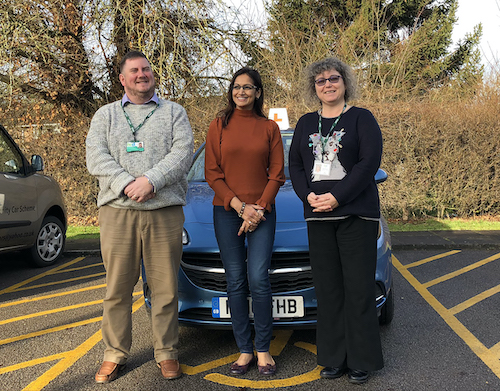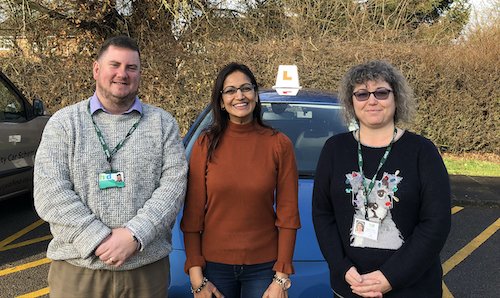
Dr Alka Chandrayan, 45 from Letchworth Garden City, has regained her motoring independence following a life-threatening condition, thanks to the support of a Hertfordshire Driving Mobility centre.
Driving Mobility is a national charity that oversees driver assessments, personal mobility guidance and accessible travel information for those who have experienced life-changing illness or have restricted mobility. Clients, such as Dr Chandrayan, can self-refer or are signposted from the DVLA, Motability, Police and healthcare professionals such as GPs and OTs (Occupational Therapists). Driving Mobility, which consists of NHS departments and independent charities, provides 20 centres with over 70 outreach facilities – all focused on road safety and appropriate vehicle adaptations.
Dr Chandrayan contacted Driving Mobility (the Herts Ability centre) following a severe attack of Viral Encephalitis. Encephalitis is a rare, serious condition in which the brain becomes inflamed and swollen. Following hospitalisation and initial rehabilitation, Alka was instructed to seek a professional driving assessment so that she could regain her licence from the DVLA.
Alka begins her story: “Being a GP, I was aware of the Driving Mobility assessment centres. I became very unwell with an acute attack of Viral Encephalitis during the summer of 2019. As per protocol, the medical authorities told me I must inform the DVLA, who put my driving licence on hold until I returned to good health and my driving ability was re-assessed. When my specialist neurologists and vocational healthcare professionals felt I appeared fit to get back to driving, they advised me to attend a driving assessment centre. My husband, Dr Shivesh Kumar Sinha, looked online and picked up the nearest Driving Mobility centre. As much as my cognitive recovery had been good, I totally understood that more complex activities, like driving and medical work, would need more comprehensive tests.”
“My husband drove me to the centre. The team were very friendly and welcoming – with a relaxed atmosphere. The encouraging leaflets in the waiting area, for people requiring assisted living, caught my instant attention and praise. My assessors Sarah Wright and Simon Edwards greeted me after a peaceful 15 minutes in the waiting area. They were both professional and courteous with a very warm smile. I was a touch anxious having never faced such a situation in my own personal life. Their very approachable yet professional demeanour put me at ease instantly. They patiently explained to me what the assessment would comprise of – screening for cognitive function, followed by an in-car assessment on the road.”
Alka’s assessment began with desk-based activities in one of the centre’s consultation rooms. She explains: “As my husband and Simon watched, Sarah carried out a series of tests to address the core neuropsychological skills necessary for safe driving. It felt very respectful and with each supported step, instilling little life-bursts of confidence in me. It felt more like those fun aptitude tests. Of course, Sarah was testing for visual perception, praxis skills, executive functioning and comprehension.”
Following the initial part of the process, Alka was then accompanied to a vehicle: “For the on-road assessment, I was in the driver’s seat with Simon next to me. Sarah was on the back seat. The centre had already taken the details of my current car and therefore had provided a vehicle with similar specifications – automatic, without any adaptations. I was reassuringly given enough time to familiarise myself with the assessment car, then we proceeded around a 14-mile route. This comprised of residential streets, town centre traffic, faster country lanes and dual carriageways. It took me about 45 minutes and included performing an emergency-stop.”
“During the whole time, the vibes were so positive. Simon kept reminding me, that it wasn’t a driving test and that I was already a proficient driver. He and Sarah had their assessor’s eyes on me as that is their job, but the manner in which it was done added so much to my confidence. Simon said: ‘Alka, even if you take a wrong turn, it doesn’t matter. In normal daily life, we can all take wrong turnings. So, as long as it is done safely, it is okay.’ A simple thing we all know, but to be reminded of it at a crucial time, in the most calm and respectful manner, made me feel that I was driving with friends!”
When the driving assessment was complete, Alka returned to a consultation room for feedback from her assessors: “I felt very positive even before I got my result. The team felt valuable to me and of immense importance, not just because they were assessing my driving, but because of the way they did it. I came out being rendered “safe to return to driving”, and a confident person plus I really hope, a better doctor! I will always inform my relevant patients and their families about this wonderful team and how Driving Mobility could be of immense help to them. Thank you Driving Mobility.”

#MyDrivingMobility
